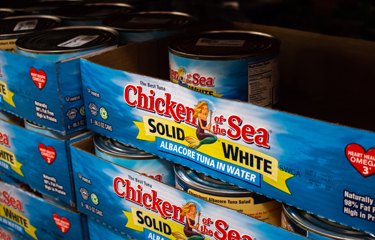Tri-Union Seafoods and Chicken of the Sea International have settled the final lawsuits emanating from their participating in a price-fixing conspiracy that artificially elevated the price of canned tuna in the U.S. market from 2011 to 2013.
In an 11 January press release issued in conjunction with a financial statement by Thai Union to the Stock Exchange of Thailand, the company said it had “reached a final agreement to settle [all] remaining antitrust litigation cases” related to the scandal.
“At this stage, all that remains is final court approval of the settlement agreement negotiated and concluded by the parties,” Thai Union President and CEO Thiraphong Chansiri said in the statement. “The settlement of these remaining antitrust litigation cases brings to an end the antitrust litigation cases in the United States of America against the company and Tri-Union.”
Tri-Union, a Thai Union subsidiary, operates the Chicken of the Sea brand of canned tuna. It, along with Bumble Bee Foods and StarKist, were accused in 2017 of involvement in anticompetitive activity in the U.S. tuna market. While Bumble Bee and StarKist eventually pleaded guilty to criminal charges of price-fixing, Tri-Union was granted immunity after it emerged that it had served as the whistleblower in the case. However, Tri-Union was still liable for civil damages stemming from its antitrust activity.
In November 2019, Tri-Union announced it had reached settlement agreements with 90 percent of all plaintiffs suing claiming damages as a result of the price-fixing. At the time, the company said it was confident it would find “fair and equitable solutions” to resolve the remainder of the lawsuits.
Thai Union set aside more than USD 100 million (EUR 81 million) for settlements related to the price-fixing lawsuits, and it reported paying out THB 1.4 billion (USD 46 million, EUR 41 million) in Q2 2019 alone. Thai Union said it has now resolved more than 30 civil complaints alleging anticompetitive activity in the U.S. tuna market.
Thai Union was originally sued in 2015, around the time the criminal complaint was filed by the U.S. Department of Justice. In July 2019, the plaintiffs were divided into four tracks: claims brought by the direct purchasers bringing their owns suits against the tuna companies, or so called “direct-action plaintiffs” (DAPs); direct purchasers pursuing a collective class action (DPPs); indirect purchasers moving forward as a putative class, or commercial food-preparers (CFPs); and individual consumers proceeding as a joint class, or end-payer plaintiffs (EPPs).
Thai Union’s latest settlements involves the DPP group, and the company said it reached an agreement to settle its claims in exchange for an undisclosed and yet-to-be-finalized payout, which will require court approval. Thai Union said it is also awaiting court approval of two other class action settlements, involving the EPP class and the CFP class.
In a statement, Chicken of the Sea said it had improved its practices in response to the civil litigation.
“Together with Thai Union, COSI has made dramatic changes to the way it does business and how it shapes the industry,” it said. “These changes include a comprehensive compliance and training program, revised ethics code of conduct and the global award-winning SeaChange sustainability platform to bring lasting change to the seafood industry for the betterment of customers, employees, the environment and natural resources on which we all rely.”
Photo courtesy of David Tonelson/Shutterstock







